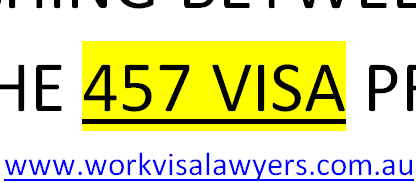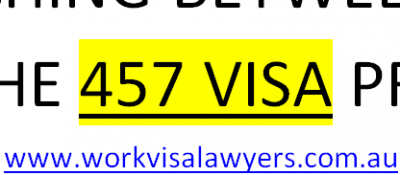The South Australian (SA) State Government has introduced school fees for 457 visa holders starting on 1 January 2017. New 457 visa holders who arrive in South Australia from 1 January 2017 will have to pay school fees for each child attending public schools. You will not be required to pay the school fees if your annual gross household income is $57,000 or lower. 457 visa holders are also charged school fees in Western Australia (WA), New South Wales (NSW) and the Australian Capital Territory (ACT).
Do note that this is only applicable to new 457 visa arrivals in SA from 1 January 2017 onwards. It will be extended to all 457 visa holders on 1 January 2018.
Here are the details about the school fees applicable:
Applicable Fees
$5,100 for each primary school child
$6,100 for each secondary school child
The full amount is applicable to the eldest child, with a 10% discount on the fees for subsequent children in school.
Payments can be made upfront, per semester/term or in regular instalments.
Income Means Testing
Families do not need to pay the full fee if their annual gross income does not exceed the income threshold. The income threshold is calculated as follows:
Family with 1 child - $77,000
Family with 2 children - $87,000
Family with 3 children - $97,000
Each additional child will increase the threshold by $10,000.
So how much do I have to pay if my gross income is above $57,000 but below the threshold?
Since you do not meet the threshold income level, you will only need to pay a percentage of the contribution fees. The percentage is calculated as such:
Family with 1 child – 5% for each $1,000 above $57,000
Family with 2 children – 3.33% for each $1,000 above $57,000
Family with 3 children – 2.5% for each $1,000 above $57,000
Here are some examples provided by the South Australia Department for Education and Child Development:
Example 1
Tomas commences work under a 457 visa arrangement and will be paid a gross income of $67 000 pa. He is accompanied by his wife, who is not in paid work, and their eight-year-old daughter, who is enrolled at the local government primary school. His contribution payable would be calculated as follows:
Step 1: Primary school rate of $5100 is the full contribution rate
Step 2: Gross family income is $67 000
Step 3: Relevant family income threshold at which full fees are payable is $77 000
Step 4: As the gross family income is between $57 000 and $77 000, Tomas will not be required to pay the full contribution rate. His income is $10 000 above the $57 000 limit, so the fee payable will be 10 x 5% x $5100 = $2550.
Example 2
Aisha commences work under a 457 visa arrangement and will be paid a gross income of $61 200 pa. She is accompanied by her husband, who is working part time and earning $20 400 p.a., and their two children. Both children attend government schools; one in secondary school, the other in primary school. The contribution payable would be calculated as follows:
Step 1: The full contribution rate is $6100 + ($5100 x 90%) = $10 690
Step 2: Gross family income, (rounded down to the nearest whole $1,000), is $81 000
Step 3: Relevant family income threshold at which full contribution is payable is $87 000
Step 4: As the gross family income is between $57 000 and $87 000, Aisha will not be required to pay the full contribution fee rate. Her family income is $24 000 above the $57 000 limit, so the fee payable will be 24 x 3.33% x $10 690 = $8 552.
Example 3
Lucinda is a sole parent who commences work under a 457 visa arrangement, and will be paid a gross income of $200 000. She is accompanied by her three children, each of whom attend government schools; one in secondary school, the other two in primary school. The contribution payable would be calculated as follows:
Step 1: The full contribution rate is $6100 + (($5100+ $5100) x 90%) = $15 280.
Step 2: Gross family income is $200 000
Step 3: Relevant family income threshold at which full fees are payable is $97 000
Step 4: As the gross family income is above $97 000, Lucinda will be required to pay the full contribution rate of $15 280.
If you are a permanent resident visa holder there is no need for you to pay the contribution fee. You can contact the Department for Education and Child Development (DECD) if you need further information.
Sources:
- https://www.decd.sa.gov.au/sites/g/files/net691/f/schoolfees_457visa.pdf
- http://www.adelaidenow.com.au/news/south-australia/state-government-poised-to-charge-parents-on-457-visas-up-to-6100-per-child-for-public-education/news-story/e0bed470801a9d11614611257fc67f63
Comments by Chris Johnston – Principal Lawyer and Registered Migration Agent at Work Visa Lawyers
This policy will make South Australia an unattractive destination for 457 visa workers with families. Additionally a SA business which genuinely needs a skilled overseas worker to work in SA will have to provide a higher salary package to compensate for the school fees applicable. Costs to the business will be higher if a South Australian business has to sponsor an overseas worker for a 457 visa.
Another note is that the new school fees for 457 visa holders are very complicated. To assess each individual 457 visa holder’s gross income and family composition to calculate the applicable fees will take time and labour. I would guess that the public cost of administering the school fees may be very high to the SA government.
This may cause more applicants to consider the Regional Sponsored Migration Scheme (RSMS) subclass 187 visa instead of the 457 visa if they are to be sponsored by a South Australian business. Many 457 visa holders may also be pushed to apply for permanent residency via the Employer Nomination Scheme subclass 186 visa or the RSMS visa via the Temporary Transition stream. There is now more incentive to consider the permanent RSMS visa over the temporary 457 visa.
This information is accurate on 5 August 2016
Do you need help with an Australian visa application?
At Work Visa Lawyers we are experienced in assisting applicants in all matters relating to Australian visa applications. Our areas of expertise include Skilled Migration visas, Business Skills Migration visas, Employer Sponsored Work Visas, Partner and other Family Migration visas as well as the Administrative Appeals Tribunal (AAT) Review, Judicial Review and Ministerial Intervention.
If you require further information regarding your Australia visa options you can contact us through:
(08) 8351 9956 or +61 8 8351 9956
or This email address is being protected from spambots. You need JavaScript enabled to view it.








